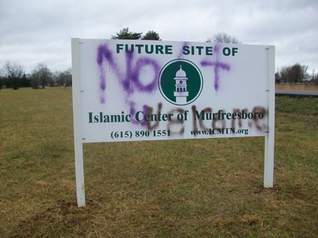 An Islamic Center of Murfreesboro leader Tuesday questioned why plaintiffs opposed to government approval of mosque construction continue to appeal their case.
An Islamic Center of Murfreesboro leader Tuesday questioned why plaintiffs opposed to government approval of mosque construction continue to appeal their case.
“We have already wasted enough energy and money on this issue,” said Saleh Sbenaty, a board member with the ICM and a 20-year professor at Middle Tennessee State University in Murfreesboro. “We have been here for over 30 years. This is our home. We are productive members of our community. We have no other place to go.”
Plaintiffs’ attorneys Joe Brandon Jr. of Murfreesboro and Thomas Smith of Franklin filed a request to appeal with the Tennessee Supreme Court on Monday. The plaintiffs hope the state’s top court will overrule a Tennessee Appeals Court decision in late May that supported the way the Rutherford County Regional Planning Commission approved plans for the ICM to construct a mosque on Veals Road, off Bradyville Pike.
The appeals court had overruled a May 2012 decision by Chancellor Robert Corlew III that the county failed to provide adequate public notice before the planning commissioners approved the ICM’s long-term plans to construct a mosque with 52,960 square feet May 24, 2010. The ICM completed the first 12,000 square feet last August and plans eventually to add a gym, indoor pool, classrooms for weekend religious school and other facilities. Corlew’s decision voided approval of the mosque and prevented the congregation from pursuing an occupancy permit.
A federal court in Nashville intervened at the request of the U.S. Department of Justice and the ICM in July 2012 and determined that the local case violated the congregation’s First Amendment religious freedom and land-use rights. The federal court ruling allowed the congregation to move into its new mosque in August 2012, before the end of the Islamic holy month of Ramadan, a time when Muslims are to fast during the day, worship at night, seek forgiveness and treat others well.
The federal court decision upset the plaintiffs. Brandon said the state’s top court should review whether the public notice was sufficient.
Sbenaty, the ICM board member, questions what Brandon hopes to accomplish. “He’s doing nothing but chasing ghosts and wasting taxpayers’ money trying to do that,” Sbenaty said during a Tuesday phone interview. “He needs to give it up and find something useful that he can do for the community.”
Brandon disagreed. “I understand that they want Shariah law (ethical codes of conduct for Muslims) in Rutherford County,” said Brandon, who contends that plaintiffs have a right in civil court to examine if the local Muslims pose a threat even though Corlew ruled that such issues should be up to law enforcement. “What is wrong with wanting to ask questions about direct ties to terrorism? What’s the harm in that? Why do we have to undergo cavity searches at the airports? It’s because of the Mulims.”
The ICM serves about 1,000 members. Prior to moving into their new center, the congregation members had held worship in a cramped, 2,250-square-foot mosque on the back side of an office building.
